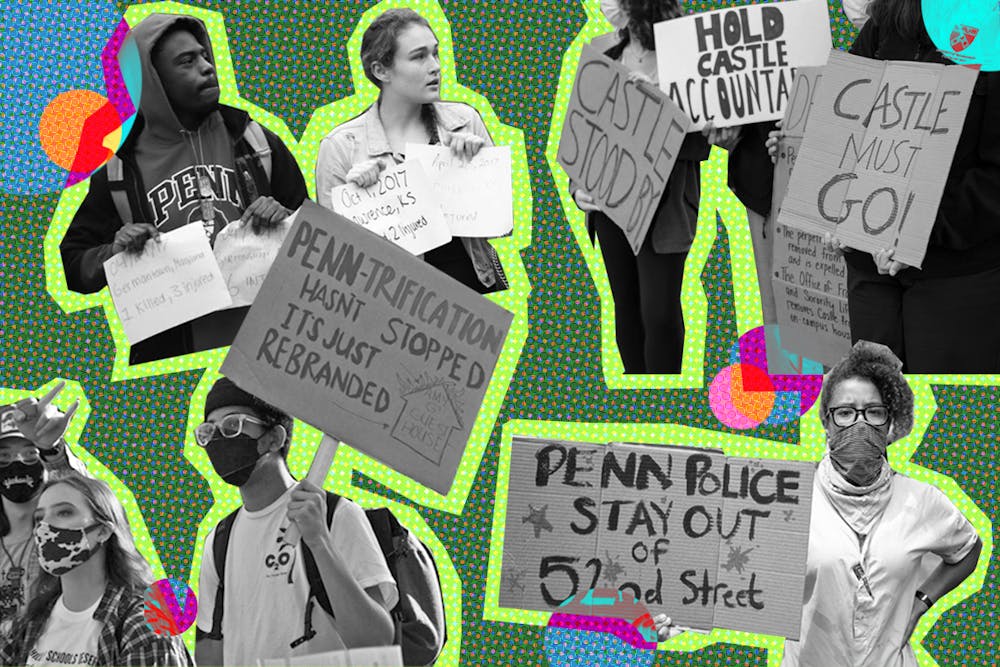Penn has a storied history of activism on its campus—one that often sought to tackle major social issues extending far beyond the University grounds. In the late 1960s, for instance, students successfully shut down recruitment events by Dow Chemicals during the Vietnam War and led high–profile teach–ins and protests. For decades, students rallied for racial justice in university education with activists like Cathy Barlow (C, W ‘71, L ‘76) leading students to a sit–in at College Hall that led to the creation of the Afro–American Studies program and DuBois College House. Kate Lam (C ’92)and other Asian American organizers spearheaded a six–year campaign in the '90s to demand a program in Asian American Studies.
This history of student activism at Penn is rooted in the national counterculture movement and “New Left” of the 1960s, where organizations like Students for a Democratic Society (SDS) advocated for participatory democracy as a means to transform society. Most of these radical organizations, including SDS, dissolved by the late '60s and early '70s. Despite their momentum, SDS did not have a consistent goal, and different factions within the organization split due to disagreements over ideas around feminism and Black power. Students today are left to navigate the intensified crisis of neoliberalism while confronting social issues with many of the same tools that activists used in the '60s and '70s.
At Penn, the grim reality is that many activist organizations disband after a year or are active only intermittently. Many of these student organizations face the same issues as their predecessors in the “New Left” movement, but these obstacles remain undiscussed.
Fossil Free Penn (FFP), a student activist group demanding Penn to “divest from fossil fuel companies and reinvest in clean and just solutions,” has encountered various challenges to organizing. While many students at Penn believe in climate science and even make personal decisions to lower their carbon footprint, FFP coordinator Katie Collier (C '22) believes many students ultimately shy away from groups like FFP due to professional interests.
“It's hard to get people to care when in one ear, they're hearing all about the finance, business, Wall Street World. And then in the other, they're hearing about social justice, equity. The finance world is definitely a lot louder for them,” she says. When finance students are encouraged to apply for jobs at companies like J.P. Morgan Chase or Citibank—companies that bankroll the fossil fuel industry—engaging with climate change advocacy can result in a contradiction between personal values and career goals.
The priorities of Penn’s leadership also place limitations on the effectiveness of student activist organizations. Penn’s Board of Trustees, the body that makes investment decisions for the school, is notoriously business–oriented, and many board members prioritize their financial interests over divestment and community reinvestment.
FFP coordinator Ari Bortman (E ‘22) recalls the frustrating process of working with the Board of Trustees, where they were asked to create a 50–page proposal for scaled–back divestment initiatives. Despite the group's time and efforts, the proposal was eventually rejected by the University. In their response to FFP, the Board of Trustees merely highlighted Penn’s efforts to improve sustainability and promote climate change research, while ignoring the hypocrisy of investing in some of the top fossil fuel companies.
Caleb Chen (C ‘21) is a former organizer for the Penn Student Labor Action Project (SLAP), a group that has been inactive on social media since December 2020. He also found that the University's bureaucracy severely limited SLAP’s organizing abilities, as Penn was insistent on maintaining Bon Appétit’s practice of subcontracting workers. He notes that the administration organized a “workers appreciation dinner” in direct response to SLAP advocating for dining hall workers, yet failed to acknowledge their activism in any way or actually increase compensation.
Besides the external pressures of the administration, activist organizations face numerous internal challenges. The typical four–year timeframe for undergraduate students inhibits continuity, making it difficult for students to create long–term goals and cultivate the next generation of leaders. “Over time, the university relies on their ability to wait out the ‘student lifetime,’” Ari says.
But there are strategies to confront these internal issues. Ari credits FFP’s organizational stability to its horizontal structure, where new members are encouraged to step up and deeply engage in the planning meetings. FFP’s success demonstrates the importance of close collaboration and collective decision–making. “Learning by doing,” Ari says, has allowed FFP to develop new leadership and maintain a high level of organizational capacity.
A sense of community is another key aspect of sustaining activist organizations and preventing burnout. Spending time together outside of planning meetings and actions becomes a vital aspect of a successful group. “It reminds us that the weight of the world is not on our shoulders, and we're allowed to relax and take care of ourselves and... each other,” Katie says. Besides fostering community within FFP, Katie also emphasizes the importance of building connections with organizations on campus and in the Philadelphia community. FFP’s relationships with organizations like Police Free Penn and Philly Thrive have helped them stay accountable to the broader community, while also hosting bigger and more impactful events.
In Chen’s work, community also plays a central role. He currently organizes with the Lotus Collective, which focuses on political education and discussion. Chen credits their relationship with the Saturday Free School for rooting them in the Philadelphia community and connecting them to the history of political struggle. “That's what's been foundational—you're able to take a leap together with other people knowing that you're committed to the same goals and the same ideas,” he says.
This struggle to branch out beyond the university points to the necessity of transforming student activism itself—bringing together different visions of liberation. The bureaucracy of the administration and challenges of the four–year student cycle both pose serious challenges to the prospects and sustainability of student organizations. But through a genuine connection between students and community members, it's possible to confront these organizing challenges and forge something new.







